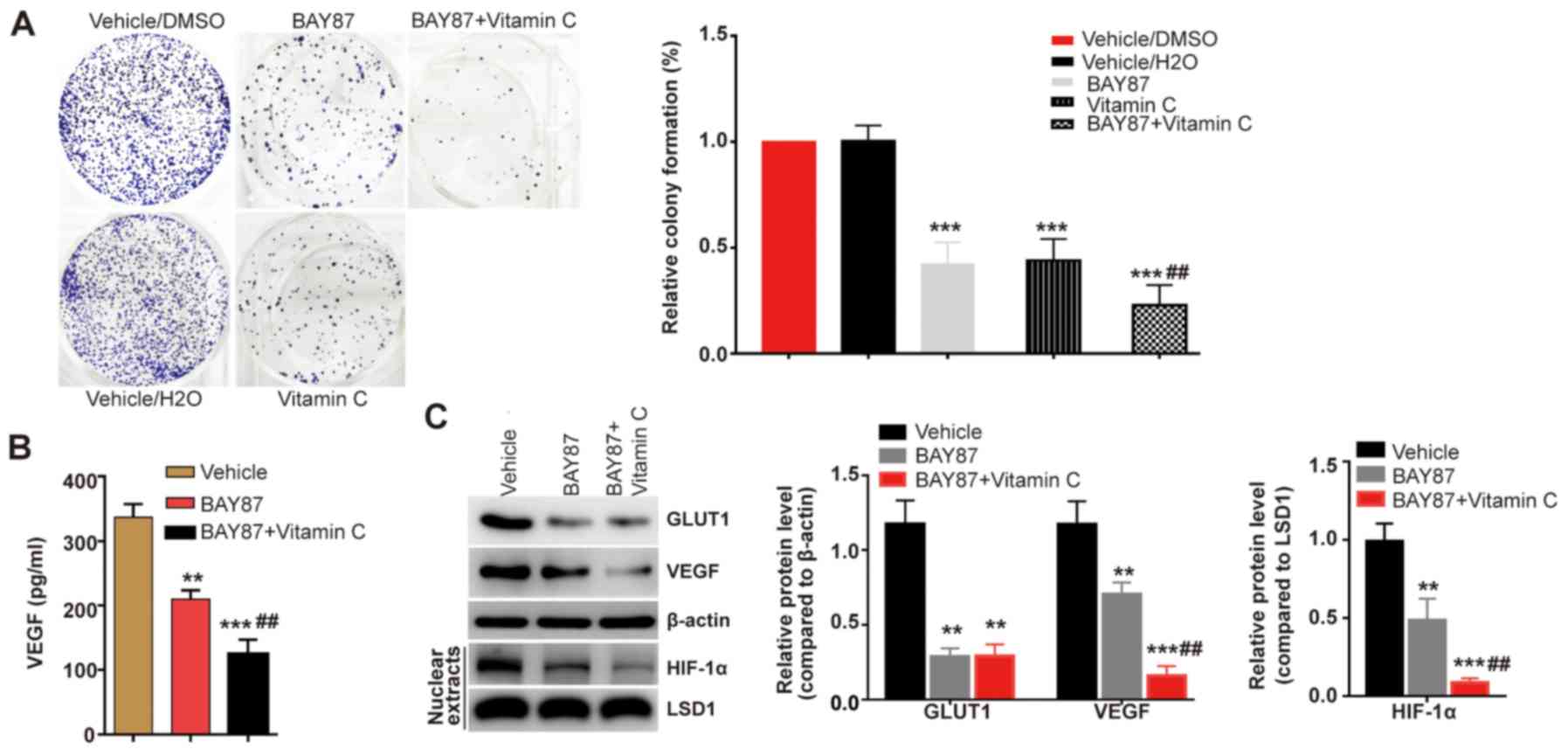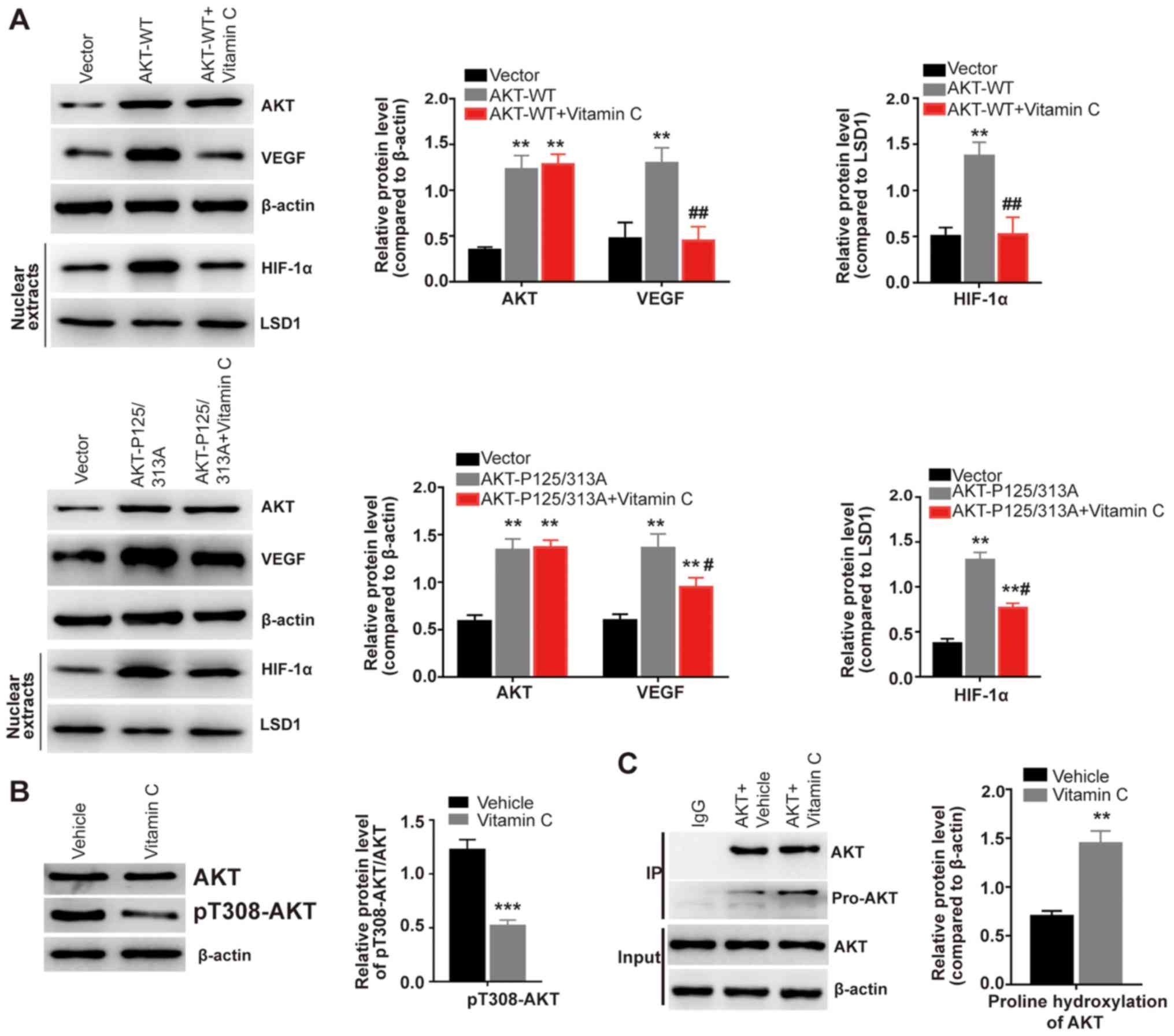|
1
|
Raj SM, Vasavada AR, Johar SR and Vasavada
VA and Vasavada VA: Post-operative capsular opacification: A
review. Int J Biomed Sci. 3:237–250. 2007.PubMed/NCBI
|
|
2
|
Moulick PS, Rodrigues F and Shyamsundar K:
Evaluation of posterior capsular opacification following
phacoemulsification, extracapsular and small incision cataract
surgery. Med J Armed Forces India. 65:225–228. 2009. View Article : Google Scholar : PubMed/NCBI
|
|
3
|
Duman R, Karel F, Özyol P and Ates C:
Effect of four different intraocular lenses on posterior capsule
opacification. Int J Ophthalmol. 8:118–121. 2015.PubMed/NCBI
|
|
4
|
Zukin LM, Pedler MG, Groman-Lupa S,
Pantcheva M, Ammar DA and Petrash JM: Aldose reductase inhibition
prevents development of posterior capsular opacification in an in
vivo model of cataract surgery. Invest Ophthalmol Vis Sci.
59:3591–3598. 2018. View Article : Google Scholar : PubMed/NCBI
|
|
5
|
Zhang C, Liu J, Jin N, Zhang G, Xi Y and
Liu H: SiRNA targeting mTOR effectively prevents the proliferation
and migration of human lens epithelial cells. PLoS One.
11:e01673492016. View Article : Google Scholar : PubMed/NCBI
|
|
6
|
Andjelić S, Drašlar K, Lumi X, Yan X, Graw
J, Facskó A, Hawlina M and Petrovski G: Morphological and
proliferative studies on ex vivo cultured human anterior lens
epithelial cells-relevance to capsular opacification. Acta
Ophthalmol. 93:e499–e506. 2015. View Article : Google Scholar : PubMed/NCBI
|
|
7
|
Abdelkader H, Alany RG and Pierscionek B:
Age-related cataract and drug therapy: Opportunities and challenges
for topical antioxidant delivery to the lens. J Pharm Pharmacol.
67:537–550. 2015. View Article : Google Scholar : PubMed/NCBI
|
|
8
|
Chang JR, Koo E, Agrón E, Hallak J,
Clemons T, Azar D, Sperduto RD, Ferris FL III and Chew EY;
Age-Related Eye Disease Study Group, : Risk factors associated with
incident cataracts and cataract surgery in the age-related eye
disease study (AREDS): AREDS report number 32. Ophthalmology.
118:2113–2119. 2011. View Article : Google Scholar : PubMed/NCBI
|
|
9
|
Thiagarajan R and Manikandan R:
Antioxidants and cataract. Free Radic Res. 47:337–345. 2013.
View Article : Google Scholar : PubMed/NCBI
|
|
10
|
Zhao L, Quan Y, Wang J, Wang F, Zheng Y
and Zhou A: Vitamin C inhibit the proliferation, migration and
epithelial-mesenchymal- transition of lens epithelial cells by
destabilizing HIF-1α. Int J Clin Exp Med. 8:15155–15163.
2015.PubMed/NCBI
|
|
11
|
Kaur A, Gupta V, Christopher AF, Malik MA
and Bansal P: Nutraceuticals in prevention of cataract-An evidence
based approach. Saudi J Ophthalmol. 31:30–37. 2017. View Article : Google Scholar : PubMed/NCBI
|
|
12
|
Valero MP, Fletcher AE, De Stavola BL,
Vioque J and Alepuz VC: Vitamin C is associated with reduced risk
of cataract in a mediterranean population. J Nutr. 132:1299–1306.
2002. View Article : Google Scholar : PubMed/NCBI
|
|
13
|
Yum S, Jeong S, Kim D, Lee S, Kim W, Yoo
JW, Kim JA, Kwon OS, Kim DD, Min DS and Jung Y: Minoxidil induction
of VEGF is mediated by inhibition of HIF-prolyl hydroxylase. Int J
Mol Sci. 19(pii): E532017. View Article : Google Scholar : PubMed/NCBI
|
|
14
|
Zhang Y, Xu Y, Ma J, Pang X and Dong M:
Adrenomedullin promotes angiogenesis in epithelial ovarian cancer
through upregulating hypoxia-inducible factor-1α and vascular
endothelial growth factor. Sci Rep. 7:405242017. View Article : Google Scholar : PubMed/NCBI
|
|
15
|
Takei A, Ekström M, Mammadzada P, Aronsson
M, Yu M, Kvanta A and André H: Gene transfer of prolyl hydroxylase
domain 2 inhibits hypoxia-inducible angiogenesis in a model of
choroidal neovascularization. Sci Rep. 7:425462017. View Article : Google Scholar : PubMed/NCBI
|
|
16
|
Xiong GF, Stewart RL, Chen J, Gao T, Scott
TL, Samayoa LM, O'Connor K, Lane AN and Xu R: Collagen prolyl
4-hydroxylase 1 is essential for HIF-1α stabilization and TNBC
chemoresistance. Nat Commun. 9:44562018. View Article : Google Scholar : PubMed/NCBI
|
|
17
|
Kuiper C and Vissers MC: Ascorbate as a
co-factor for fe- and 2-oxoglutarate dependent dioxygenases:
Physiological activity in tumor growth and progression. Front
Oncol. 4:3592014. View Article : Google Scholar : PubMed/NCBI
|
|
18
|
Livak KJ and Schmittgen TD: Analysis of
relative gene expression data using real-time quantitative PCR and
the 2(-Delta Delta C(T)) method. Methods. 25:402–408. 2001.
View Article : Google Scholar : PubMed/NCBI
|
|
19
|
Zhou L, Wang Y, Zhou M, Zhang Y, Wang P,
Li X, Yang J, Wang H and Ding Z: HOXA9 inhibits HIF-1α-mediated
glycolysis through interacting with CRIP2 to repress cutaneous
squamous cell carcinoma development. Nat Commun. 9:14802018.
View Article : Google Scholar : PubMed/NCBI
|
|
20
|
Carmeliet P, Dor Y, Herbert JM, Fukumura
D, Brusselmans K, Dewerchin M, Neeman M, Bono F, Abramovitch R,
Maxwell P, et al: Role of HIF-1alpha in hypoxia-mediated apoptosis,
cell proliferation and tumour angiogenesis. Nature. 394:485–490.
1998. View Article : Google Scholar : PubMed/NCBI
|
|
21
|
Finley LW, Carracedo A, Lee J, Souza A,
Egia A, Zhang J, Teruya-Feldstein J, Moreira PI, Cardoso SM, Clish
CB, et al: SIRT3 opposes reprogramming of cancer cell metabolism
through HIF1α destabilization. Cancer Cell. 19:416–428. 2011.
View Article : Google Scholar : PubMed/NCBI
|
|
22
|
Groulx I and Lee S: Oxygen-dependent
ubiquitination and degradation of hypoxia-inducible factor requires
nuclear-cytoplasmic trafficking of the von Hippel-Lindau tumor
suppressor protein. Mol Cell Biol. 22:5319–5336. 2002. View Article : Google Scholar : PubMed/NCBI
|
|
23
|
Shiozaki A, Shen-Tu G, Bai X, Iitaka D, De
Falco V, Santoro M, Keshavjee S and Liu M: XB130 mediates cancer
cell proliferation and survival through multiple signaling events
downstream of Akt. PLoS One. 7:e436462012. View Article : Google Scholar : PubMed/NCBI
|
|
24
|
Karar J and Maity A: PI3K/AKT/mTOR pathway
in angiogenesis. Front Mol Neurosci. 4:512011. View Article : Google Scholar : PubMed/NCBI
|
|
25
|
Guo J, Chakraborty AA, Liu P, Gan W, Zheng
X, Inuzuka H, Wang B, Zhang J, Zhang L, Yuan M, et al: pVHL
suppresses kinase activity of Akt in a
proline-hydroxylation-dependent manner. Science. 353:929–932. 2016.
View Article : Google Scholar : PubMed/NCBI
|
|
26
|
Woo YM, Shin Y, Lee EJ, Lee S, Jeong SH,
Kong HK, Park EY, Kim HK, Han J, Chang M and Park JH: Inhibition of
aerobic glycolysis represses Akt/mTOR/HIF-1α axis and restores
tamoxifen sensitivity in antiestrogen-resistant breast cancer
cells. PLoS One. 10:e01322852015. View Article : Google Scholar : PubMed/NCBI
|
|
27
|
Pore N, Jiang Z, Shu HK, Bernhard E, Kao
GD and Maity A: Akt1 activation can augment hypoxia-inducible
factor-1alpha expression by increasing protein translation through
a mammalian target of rapamycin-independent pathway. Mol Cancer
Res. 4:471–479. 2006. View Article : Google Scholar : PubMed/NCBI
|
|
28
|
Li JH, Wang NL and Wang JJ: Expression of
matrix metalloproteinases of human lens epithelial cells in the
cultured lens capsule bag. Eye (Lond). 22:439–444. 2008. View Article : Google Scholar : PubMed/NCBI
|
|
29
|
Chandler HL, Barden CA, Lu P, Kusewitt DF
and Colitz CM: Prevention of posterior capsular opacification
through cyclooxygenase-2 inhibition. Mol Vis. 13:677–691.
2007.PubMed/NCBI
|
|
30
|
Shi GH and Zhou L: Emodin suppresses
angiogenesis and metastasis in anaplastic thyroid cancer by
affecting TRAF6-mediated pathways in vivo and in
vitro. Mol Med Rep. 18:5191–5197. 2018.PubMed/NCBI
|
|
31
|
Palazon A, Tyrakis PA, Macias D, Veliça P,
Rundqvist H, Fitzpatrick S, Vojnovic N, Phan AT, Loman N, Hedenfalk
I, et al: An HIF-1α/VEGF-A axis in cytotoxic T cells regulates
tumor progression. Cancer Cell. 32:669–683 e665.e5. 2017.
View Article : Google Scholar : PubMed/NCBI
|
|
32
|
Zhang Z, Yao L, Yang J, Wang Z and Du G:
PI3K/Akt and HIF-1 signaling pathway in hypoxia-ischemia (Review).
Mol Med Rep. 18:3547–3554. 2018.PubMed/NCBI
|
|
33
|
Choi SB, Park JB, Song TJ and Choi SY:
Molecular mechanism of HIF-1-independent VEGF expression in a
hepatocellular carcinoma cell line. Int J Mol Med. 28:449–454.
2011.PubMed/NCBI
|
|
34
|
Arsham AM, Plas DR, Thompson CB and Simon
MC: Akt and hypoxia-inducible factor-1 independently enhance tumor
growth and angiogenesis. Cancer Res. 64:3500–3507. 2004. View Article : Google Scholar : PubMed/NCBI
|
|
35
|
Satheesh NJ, Samuel SM and Busselberg D:
Combination therapy with vitamin c could eradicate cancer stem
cells. Biomolecules. 10(pii): E792020. View Article : Google Scholar : PubMed/NCBI
|
|
36
|
Fischer AP and Miles SL: Ascorbic acid,
but not dehydroascorbic acid increases intracellular vitamin C
content to decrease hypoxia inducible factor-1 alpha activity and
reduce malignant potential in human melanoma. Biomed Pharmacother.
86:502–513. 2017. View Article : Google Scholar : PubMed/NCBI
|
|
37
|
Jaakkola P, Mole DR, Tian YM, Wilson M,
Gielbert J, Gaskell SJ, von Kriegsheim A, Hebestreit HF, Mukherji
M, Schofield CJ, et al: Targeting of HIF-alpha to the von
Hippel-Lindau ubiquitylation complex by O2-regulated prolyl
hydroxylation. Science. 292:468–472. 2001. View Article : Google Scholar : PubMed/NCBI
|
|
38
|
Marxsen JH, Stengel P, Doege K, Heikkinen
P, Jokilehto T, Wagner T, Jelkmann W, Jaakkola P and Metzen E:
Hypoxia-inducible factor-1 (HIF-1) promotes its degradation by
induction of HIF-alpha-prolyl-4-hydroxylases. Biochem J.
381:761–767. 2004. View Article : Google Scholar : PubMed/NCBI
|
|
39
|
Kawasaki Y, Fujiki M, Uchida S, Morishige
M, Momii Y and Ishii K: A single oral dose of geranylgeranylacetone
upregulates vascular endothelial growth factor and protects against
kainic acid-induced neuronal cell death: Involvement of the
phosphatidylinositol-3 kinase/akt pathway. Pathobiology.
84:184–191. 2017. View Article : Google Scholar : PubMed/NCBI
|
|
40
|
Lindsey RC, Cheng S and Mohan S: Vitamin C
effects on 5-hydroxymethylcytosine and gene expression in
osteoblasts and chondrocytes: Potential involvement of PHD2. PLoS
One. 14:e02206532019. View Article : Google Scholar : PubMed/NCBI
|
|
41
|
Xing W, Pourteymoor S and Mohan S:
Ascorbic acid regulates osterix expression in osteoblasts by
activation of prolyl hydroxylase and ubiquitination-mediated
proteosomal degradation pathway. Physiol Genomics. 43:749–757.
2011. View Article : Google Scholar : PubMed/NCBI
|
|
42
|
Lee HY, Lee T, Lee N, Yang EG, Lee C, Lee
J, Moon EY, Ha J and Park H: Src activates HIF-1α not through
direct phosphorylation of HIF-1α specific prolyl-4 hydroxylase 2
but through activation of the NADPH oxidase/Rac pathway.
Carcinogenesis. 32:703–712. 2011. View Article : Google Scholar : PubMed/NCBI
|



















